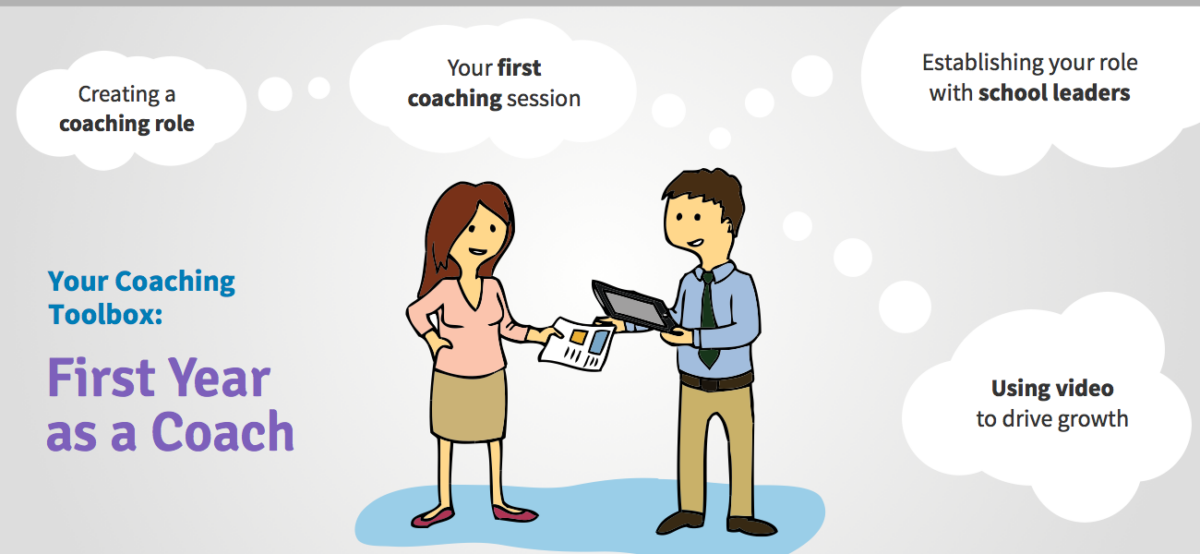
Featured Resource
Why Over Half of California School Districts Trust SchoolStatus
Read More >Join Mission: Attendance to reduce chronic absenteeism in 2025-26! >> Learn How <<





Kara McFarlin, an instructional technology coach in Illinois, shares five ways she made coaching a team effort during her first year as a coach. For more insights like hers from other new coaches check out our First Year as a Coach series!
W
hile I survived my first year as an instructional technology coach, I definitely couldn’t have done it alone. It’s almost summer and as I reflect on this past year while my son plays on two baseball teams I’m prompted to compare much of the year to a team sport. And if you search for the characteristics of a successful team, many of those same attributes appear and when thinking about what went into my own successes this year.
I’ve learned that each person I work with has a preferred method of communication. Being spread across multiple buildings, I tend to default to email for communication. However, there is something to be said for communicating in person; while talking in person I can read body language and assess the conversation better, whereas email closes off the conversation.
In person communication creates opportunities to extend the conversation and answer questions in real time, while gauging the responses of the coachee. This isn’t to say that email communication isn’t important, there just needs to be a mix. Sometimes I need to just email something quick and sometimes I need to meet with a teacher. What’s important to remember is to follow up after the conversation—which can be another conversation or a reflection form—because coaches need to always keep the conversation going!
Our district’s team of coaches rely on a collaborative system that allows us to share our coaching work with one another (currently using Google Drive). We have a shared space for our resources and we schedule time to meet together for planning sessions. Our team plans professional learning opportunities together, share discoveries and resources, debriefs, and reflects. When planning professional learning days for our staff, we found value in dividing and conquering the tasks. We found that when working with teachers, those collaborative planning tools come in handy for documenting the process and progress, while improving communication throughout.
My son has played baseball for several years and as a parent, I’ve appreciated the coaches that encourage the players. Why? Because everyone needs someone in their corner cheering them on. Instructional Coaches need to cheer on their coworkers and celebrate successes together to build and continue momentum for success. Be the cheerleader for your teachers!
A resource hub is a must and our team of coaches shares resources and collaborate regularly. One way I stay organized is a planner and I use a mix between a physical and digital one. I use a disc-bound personalized planner system to create my own “Playbook Planner.” Inside, I have a “Brain Dump” area in the back for notes, and staff directories in the front with master schedules. Also, I have monthly planning pages in the middle of the planner where I use a color-coding system to label activities for different buildings. Any activities, lessons, and/or meetings with teachers are scheduled through a shared calendar. I have found that creating events in a shared calendar (e.g., Google Calendar) is helpful for confirming, scheduling, and reminding participants.
I am blessed to be one of three coaches in our district. My colleague, Lindsay, has been coaching in the district for a couple of years while Michelle and I have experienced our first year of coaching together. The best part of this past year was having a mentor who was also an instructional technology coach to learn and develop from. When I was having a bad day, for instance, my mentor called and offered insight that I had not considered to help me out.
If you’re unable to collaborate with coaches within your district, Twitter is a valuable resource to keep up with current trends and ideas in the coaching world.
Coaching can be a lonely job! I recommend building a coaching alliance—even add an administrator to the mix—and you will achieve valuable support and backing within your role. Just remember, there are always people you can learn from and grow with as a coach!
Kara McFarlin is a first year K-8 Instructional Technology Coach in a south suburb of Chicago, IL. Prior to coaching, she taught technology to 4th and 5th grade students at two schools for 13 years. Kara has presented at local and state conferences and is excited to present at ISTE 2018 this year. This will be Kara’s first time attending ISTE and she looks forward to connecting with others to enhance her PLN during the conference.
Follow Kara on Twitter @mrstechfarlin.
{{cta(‘352a410e-db79-4f33-a482-d301e8041965′,’justifycenter’)}}
 SchoolStatusSchoolStatus gives educators the clarity and tools they need to get students to class and keep them moving ahead. Through our integrated suite of data-driven products, we help districts spot attendance patterns early, reach families in ways that work for them, and support teacher growth with meaningful feedback. Our solutions include automated attendance interventions, multi-channel family communications in 130+ languages, educator development and coaching, streamlined digital workflows, and engaging school websites. Serving over 22 million students across thousands of districts in all 50 states, SchoolStatus helps teachers and staff see what matters, act with speed, and stay focused on students.
SchoolStatusSchoolStatus gives educators the clarity and tools they need to get students to class and keep them moving ahead. Through our integrated suite of data-driven products, we help districts spot attendance patterns early, reach families in ways that work for them, and support teacher growth with meaningful feedback. Our solutions include automated attendance interventions, multi-channel family communications in 130+ languages, educator development and coaching, streamlined digital workflows, and engaging school websites. Serving over 22 million students across thousands of districts in all 50 states, SchoolStatus helps teachers and staff see what matters, act with speed, and stay focused on students.
News, articles, and tips for meeting your district’s goals—delivered to your inbox.






